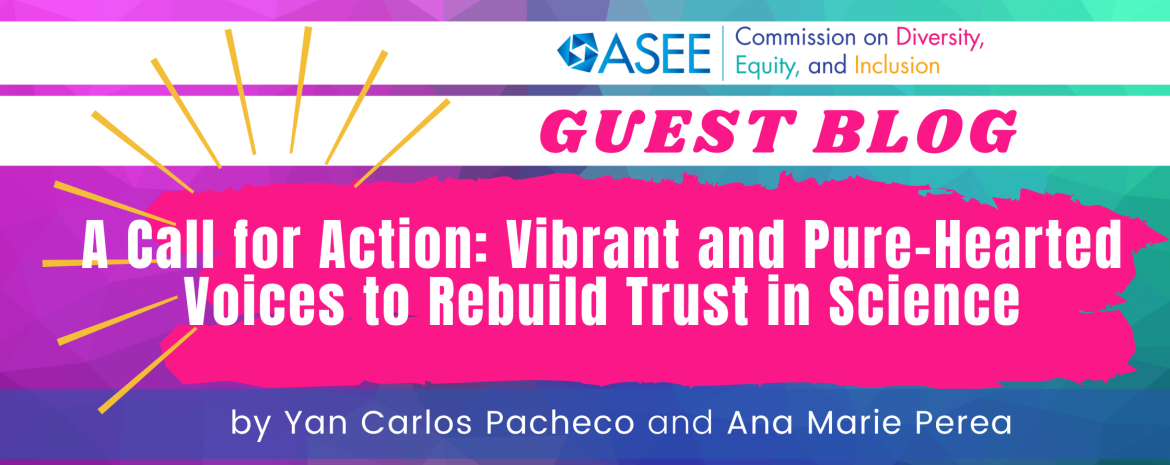A Call for Action: Vibrant and Pure-Hearted Voices to Rebuild Trust in Science
By Yan Carlos Pacheco and Ana Marie Perea
During this Latinx Heritage Month, we reflect on how celebrating history, path, and achievements is also about raising our voices and amplifying their echo. These celebrations remind us that representation is not only about honoring the past but also about inspiring younger generations and bringing communities together. In science, this means elevating diverse perspectives, ensuring that our stories and contributions shape the world through discoveries with real impact, and creating spaces where others can see themselves as creators, innovators, and belonging in the scientific field.
LatinXinBME is a community-driven network of Latinx scientists and allies dedicated to fostering mentorship and professional growth across the Biomedical Engineering research field. It brings together individuals from diverse Latinx roots who strive to live with purpose while advancing scientific and technological progress. It is a supportive space where shared struggles transform into collective strength, united by the mission of uplifting underrepresented voices in STEM. At its core, LatinXinBME embodies the belief that science thrives when diverse perspectives are empowered. Our community ranges from students in their first years of undergraduate study to tenured professors and industry scientists. Our goal is to create a spirit of inclusion and support that extends beyond Latinx identity, reminding us that science is never a solitary pursuit but a collective journey, one that allows us to break barriers and open doors for all underrepresented voices in STEM.
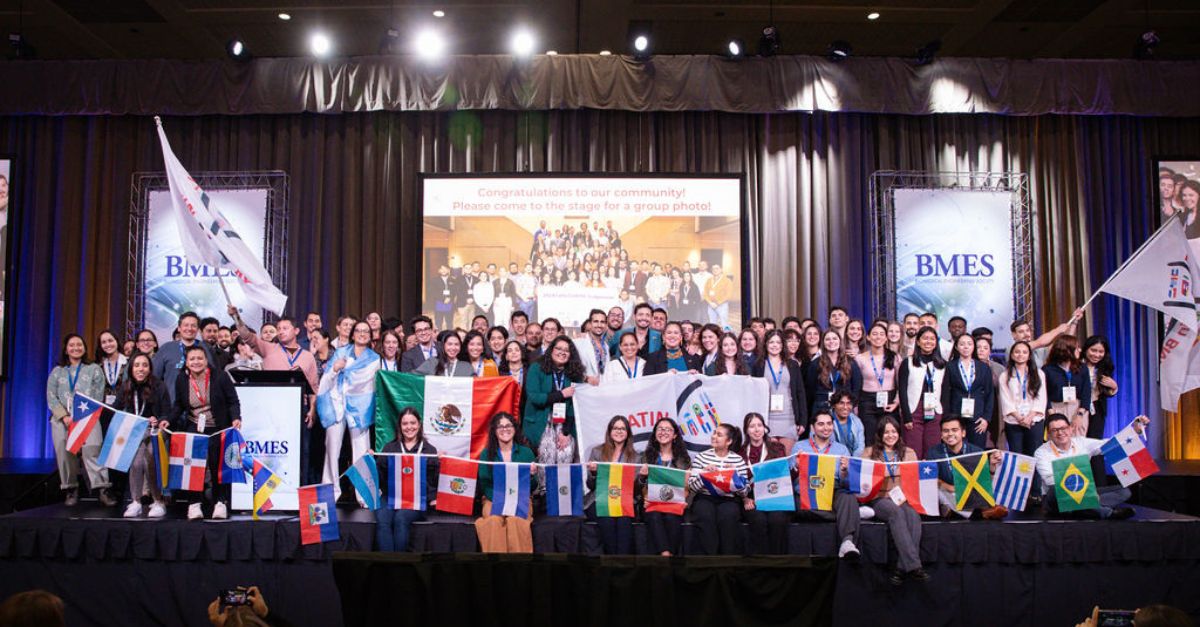
A moment of celebration, inclusion, and belonging during the 2024 BMES Diversity Award Lecture
Recently, one of us was reviewing a paper from Birsoy et al., “An Essential Role of the Mitochondrial Electron Transport Chain in Cell Proliferation Is to Enable Aspartate Synthesis.” At the same time, another group in class was assigned Sullivan et al.’s “Supporting Aspartate Biosynthesis Is an Essential Function of Respiration in Proliferating Cells.” Surprisingly, both papers, originating from the same institution and published in the same issue of Cell (Volume 162, Issue 3, 2015), arrived at the same core concept through different experimental approaches. Even more unusual, the articles cited each other within the same issue, suggesting the teams knew they were working in parallel on the same question. Journals rarely publish such overlapping work simultaneously, but in this case, the complementarity of the two studies strengthened the overall impact of the discovery.
This example reflects a broader truth: science can be done in many ways, shaped by the perspectives, training, and cultural roots of those who pursue it. Different approaches enrich science, but their real power emerges when results are confirmed and discoveries validated. Just as two independent labs can echo each other’s findings and lend stronger validity to a conclusion, scientists strengthen trust when our ideas are resounded by trusted sources and backed by clear scientific references, repeated in ways that build reliability, not distortion, and reinforced within the communities where we live and work today.
For this reason, communication is not only a responsibility but also a skill, one that does not come naturally to all of us. It takes practice, mentorship, and courage to translate complex ideas into words that resonate beyond the lab. Yet this effort is essential, because the public perception of scientific integrity is shaped not only by the evidence itself but by how clearly, openly, and authentically we share it. In today’s world, where misinformation, polarization, and trust in science are increasingly questioned, clear and heartfelt communication is as important as the experiments themselves. By learning to tell our scientific stories with both clarity and sincerity, we can rebuild public trust, highlight the societal relevance of our work, and inspire future generations to see science as a force for good.
This is why we strive to create free virtual events where members can strengthen their communication skills, whether by interacting with editors of leading journals to understand how best to frame their research, joining industry interview panels to explore what lies beyond academia, or participating in our annual LatinXinBME symposium. The symposium is a full-day event where members gather in person to engage in poster and oral sessions, listen to a keynote speaker, present their research in a three-minute thesis talk in Spanish, participate in a workshop, and conclude with a networking social. The day is designed to foster empowerment and create opportunities to connect with others who may have faced similar struggles, reminding participants that these challenges can be overcome and that shared stories can fuel both confidence and inspiration. We strategically hold the symposium the day before the Biomedical Engineering Society (BMES) conference so attendees don’t need separate funding, but simply arrive a day earlier for ours. Surveys show that this model has increased attendee confidence in navigating the larger BMES conference and enhanced their sense of connection and recognition within the scientific community.
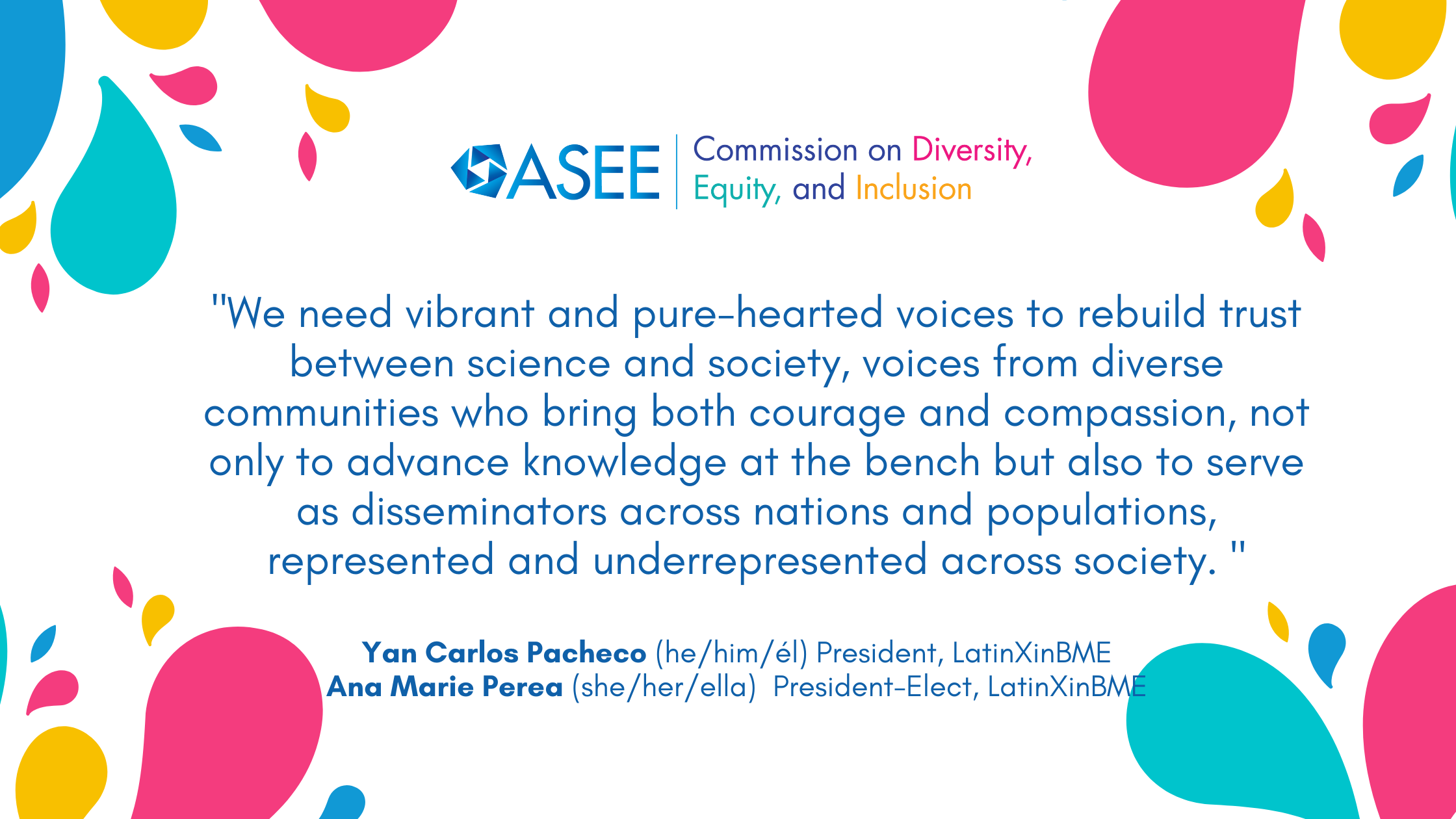
As we work to empower our members in a time when science policy is trending toward cuts in research funding, reductions in student fellowships, and added obstacles for international scientists simply trying to do their science in the best possible environments for discovery, alongside growing public doubt fueled by misinformation, this year’s symposium workshop is themed “A Collective Call to Action: The Importance of Advocacy and Avenues for Engagement in Biomedical Engineering.” We have invited Dr. Jason Marvin, who serves as the director of Outreach and Engagement at AIMBE, to lead this workshop and teach attendees how they can advocate for both their science and their community. This space will allow participants to reflect on how policy decisions shape biomedical engineering, and how scientists, particularly from underrepresented backgrounds, can help shape the future of research through engagement, advocacy, and leadership.
In the recent book Nexus, Yuval Noah Harari highlights how AI and large networks of cooperation and communication have been built, yet the power these networks provide is sometimes used unwisely. Information, after all, is not the same as truth. The naive view assumes that more data naturally leads to wisdom and order, but history reminds us that power does not always walk hand in hand with wisdom. Information is simply what connects points in a network, it puts things in formation, but it does not necessarily inform us in ways that build understanding or trust.
This is precisely why scientific research has long relied on peer review as a strong, self-correcting mechanism. We are convinced that, while not without its flaws, peer review remains one of the most efficient systems we have for validating discoveries and ensuring that evidence is rigorously examined before being accepted. And maybe not everyone outside of science knows that, but we do, and it is our responsibility to make it clear to broader society. Only then can scientific discoveries receive the trust they deserve, and only then can science continue to serve humanity as a force for progress and for good.
In retrospect, the call for action is clear: protect science and continue cultivating the skills needed to communicate and engage more effectively with the public. We need vibrant and pure-hearted voices to rebuild trust between science and society, voices from diverse communities who bring both courage and compassion, not only to advance knowledge at the bench but also to serve as disseminators across nations and populations, represented and underrepresented across society. We need strong voices that serve as role models, voices that citizens can trust because they feel a sense of equality and connection, knowing these scientists have experienced the same obstacles or carry the same heritage. By standing together, communicating with authenticity, and embracing our diverse perspectives, we can ensure that our communities see science as a force for progress for all.
A warm written hug,
Yan Carlos Pacheco and Ana Marie Perea on behalf on the LatinXinBME family
About the Authors
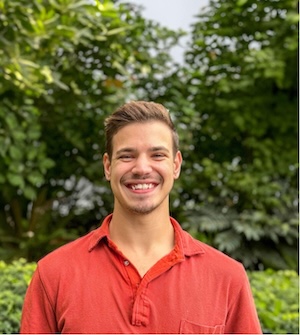 Yan Carlos Pacheco (he/him/él) is the current LatinXinBME president and is finishing up the last year of his Ph.D. in BioEngineering at the University of Oregon. He was born in Havana, Cuba and grew up in Miami before attending Santa Fe Community College and later attaining his bachelor’s degree from the University of Florida in Biomedical Engineering. It was during his last year at UF that he was introduced to the LatinXinBME community, which at the time had ~70 members. While he started out as a regular member of the group, Yan Carlos slowly got more involved in the community, taking on different roles and chair responsibilities from communication, social, vice-president, and now president. One of the most rewarding events he’s helped organize and execute is the in person LatinXinBME symposium. Watching the online community grow to nearly >600 members, he has found that the relationships built online are even stronger offline.
Yan Carlos Pacheco (he/him/él) is the current LatinXinBME president and is finishing up the last year of his Ph.D. in BioEngineering at the University of Oregon. He was born in Havana, Cuba and grew up in Miami before attending Santa Fe Community College and later attaining his bachelor’s degree from the University of Florida in Biomedical Engineering. It was during his last year at UF that he was introduced to the LatinXinBME community, which at the time had ~70 members. While he started out as a regular member of the group, Yan Carlos slowly got more involved in the community, taking on different roles and chair responsibilities from communication, social, vice-president, and now president. One of the most rewarding events he’s helped organize and execute is the in person LatinXinBME symposium. Watching the online community grow to nearly >600 members, he has found that the relationships built online are even stronger offline.
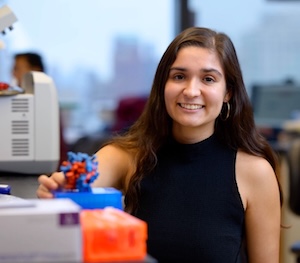
Ana Marie Perea (she/her/ella) serves as the President-Elect of the LatinXinBME organization and is a first-year Cancer Engineering PhD student at the Gerstner Sloan Kettering Graduate School of Biomedical Sciences at Memorial Sloan Kettering Cancer Center. Born and raised in Mexico, she earned a bachelor’s degree in Biomedical Engineering with a minor in Biomedical Microtechnologies from Tecnologico de Monterrey. Her undergraduate training included a year-long full-time research program with Dr. Su Ryon Shin at Harvard Medical School, where she focused on hydrogels-based therapeutic delivery strategies for tissue regeneration.
After graduating, and before applying to graduate school, Ana Marie spent two years as a research technician in the Cancer Nanomedicine Lab at Memorial Sloan Kettering under the mentorship of Dr. Daniel Heller. At the Heller Lab, she led and contributed to projects at the interface of nanomedicine, drug delivery, and cancer biology. Outside the bench, Ana Marie co-founded the GSK Outreach Club, an initiative designed to inspire high school students in the New York City area to pursue science. Through this program, she engages the broader community, raises awareness of diverse research fields, and provides resources for students interested in STEMM careers, placing particular emphasis on supporting underrepresented groups who may lack access to information about opportunities in science.
Do you want to become a guest blogger?
CDEI Guest Blog highlight future events, describe best practices, or share calls to action by CDEI members. We invite you to propose posts that share brief research highlights, reports of impactful initiatives, critical thought pieces, and resources you find useful. We especially encourage emerging scholars to share their work. If you are interested in sharing a blog or resource post, you may submit your proposal here. All posts are screened and edited.

